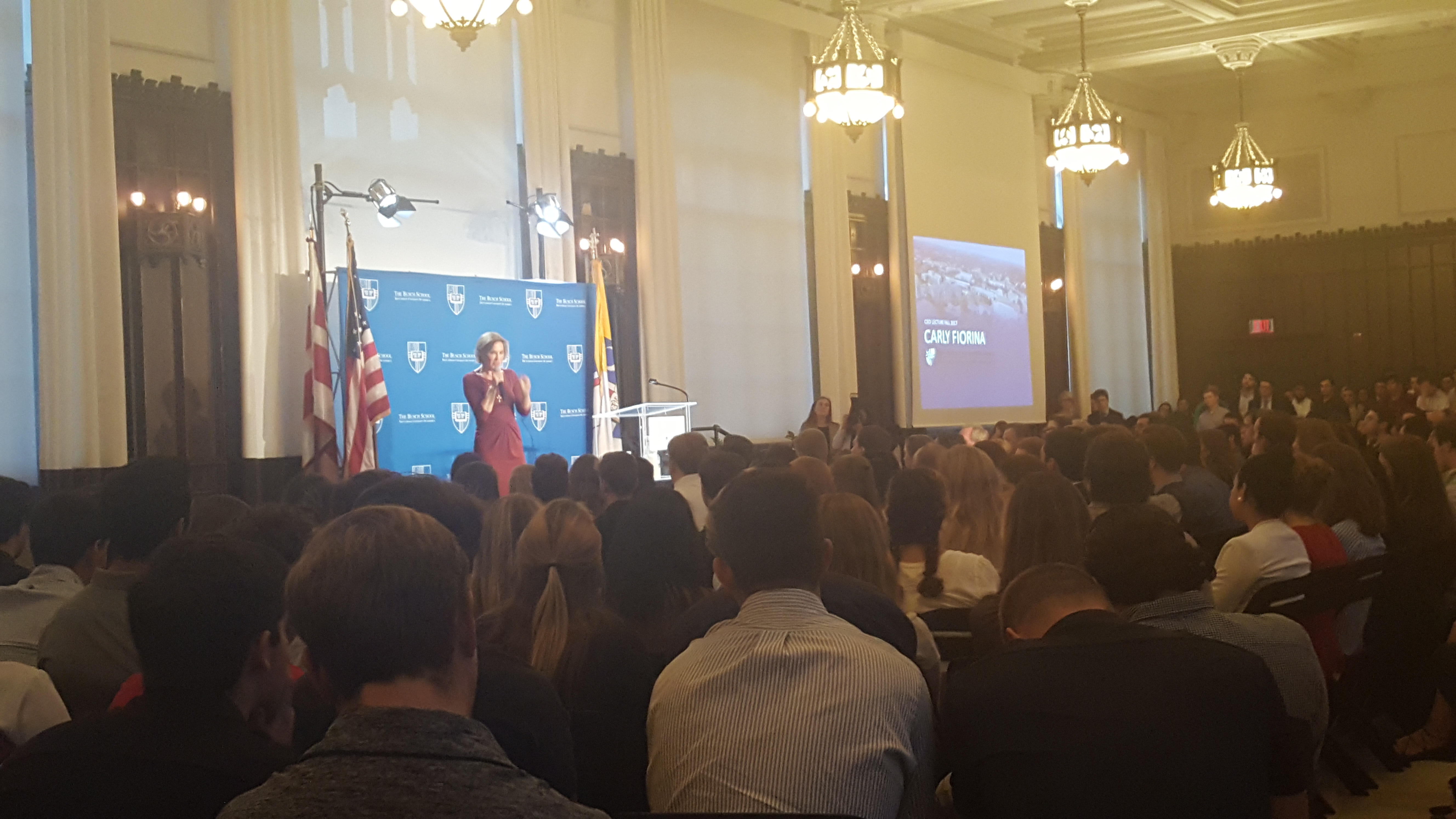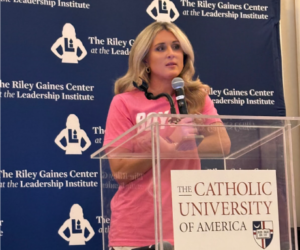Former Presidential Candidate Carly Fiorina Speaks at Heritage Hall

By Liz Friden
Former presidential candidate Carly Fiorina spoke in Heritage Hall on Tuesday, October 25th. Hundreds of Catholic University students and faculty filled the room to hear Fiorina talk about becoming a leader and discovering one’s potential.
Students were eager to hear from the woman they had seen on TV and learned about in their business classes. For college students, the future is scary to think about. Sitting in that room, many do not know where they will be interning or working in a year. Fiorina is a woman who graduated college with a major in medieval history and philosophy knows that and spoke to students about it.
Most students know Fiorina as the woman who ran for president. She spoke about her journey from an unemployable college student to presidential candidate. She made clear to students that she was not born a leader, but became one. Fiorina was not born to be the CEO of Hewlett-Packard; her time as a secretary at a real estate firm and representative for AT&T made her into one. Or, as Fiorina said, she found the courage to be one.
Callie Danna, a junior accounting major, anticipated Fiorina with excitement.
“I’m really excited that Carly Fiorina is on campus today; she is a great Catholic woman. I learned a lot about her in my management class,” Danna said. “She is also a great politician. I’m really excited to hear what she has to say about Catholic values.”
Fiorina stressed that one needs Catholic values to succeed as a leader. These include valuing oneself as a person, and knowing you have ideas to offer that others do not. Fiorina used these values to become one of the first women to lead a Fortune 500 company. She was the first woman to become a major presidential candidate for the Republican Party.
Fiorina answered promptly when asked if it was more difficult to be a CEO or a presidential candidate.
“They are different. Being President of the United States would be harder than being a CEO. But being a CEO is harder than running for president because there are consequences to what you are doing as a CEO, as opposed to running for president, as we now know.”
After her time as CEO, Fiorina was the chair of Opportunity International, where she helped lift millions of people out of poverty. Fiorina used her position to help women all around the world, valuing what they had to offer and giving them a chance.
“That’s what being a leader is,” Fiorina explained. “Everyone has more potential than they realize. Each one of us needs to understand that we can lead wherever we are and that we can make progress in the problems that impact us and those around us. We don’t have to wait for someone else.”
It took a long time for Fiorina to have this understanding of leadership.
“I used to think a leader was whoever had a big office, the big title.”
She now has a different understanding of leadership.
“A leader challenges the status quo. A leader does not allow a problem to fester. A leader does something valiant, and that’s different then a manager,” Fiorina said. “Leadership is not about position or title; leadership is about solving problems. Leadership is about producing results that make a positive difference.”
A leader needs to have courage because it’s hard to challenge the status quo. Problems arise when people are invested in the status quo, when they want to keep what they have, or are scared of what they do not know. Imagine if Fiorina had gone to law school and become a mediocre lawyer. If not her, who would have broken those corporate glass ceilings and when? A leader must have the courage to do more in life then have it just pass by. A leader has to have the courage to change things, to change the status quo.
“Criticism is the price of leadership,” Fiorina explained further. “If no one is criticizing you, then you are not getting anything done.”
Fiorina spoke briefly on her run for president near the end of her talk.
“I would have laughed relatively recently if you had told me I was going to run for president,” Fiorina said.
She spoke of her fundamental beliefs in small government and the Constitution. While admitting that people need help to help themselves, she referenced the work she had done for Opportunity International in India.
As for the political climate, she added, “Leadership is not about position and title. There are people with position and title who lead, but it is not because of their position and title.”







